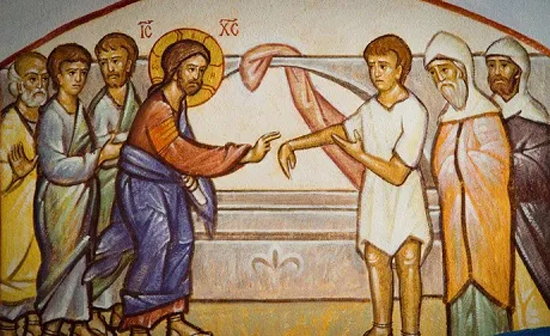Christian Art | Prayer And Miracles
Mark 3: 1-6 – Week 2 Ordinary Time, Wednesday (Audio Bible KJV, Spoken Word)
1 AND he entered again into the synagogue; and there was a man there which had a withered hand.
2 And they watched him, whether he would heal him on the sabbath day; that they might accuse him.
3 And he saith unto the man which had the withered hand, Stand forth.
4 And he saith unto them, Is it lawful to do good on the sabbath days, or to do evil? to save life, or to kill? But they held their peace.
5 And when he had looked round about on them with anger, being grieved for the hardness of their hearts, he saith unto the man, Stretch forth thine hand. And he stretched it out: and his hand was restored whole as the other.
6 And the Pharisees went forth, and straightway took counsel with the Herodians against him, how they might destroy him.
By now, and at such an early stage in Jesus’ ministry, the Jewish religious establishment is coming to fear and to hate Jesus. The Pharisees watch him, like malign, predatory spirits, looking to see fault and ready to pounce on any incriminating evidence. They have already closed their hearts against Jesus. To the Pharisees, Jesus represents a threat – to their own prestige – and an affront to their religious dogmas.
As he heals the man with the withered hand – in the synagogue, on the Sabbath – Jesus knows the hardness of the Pharisees’ hearts and feels so sorry that they should refuse all that he could give to them. In yesterday’s Gospel verses, immediately preceding these, Jesus announced that the Son of man is lord of the Sabbath, identifying himself with the figure of prophecy. Today, once more, he demonstrates this lordship, this authority, by making a man whole, restoring his health to him.
How, we may ask, could this possibly be wrong? We all ask to be healed on the Sabbath, or now the Lord’s day. Christ looks at the Pharisees with anger. Their abuse of their religious authority is an evil. As if further to prove this, the Pharisees and the Herodians, who were themselves enemies, now conspire together to try to destroy the one who is wholly good.
‘BLESSED is the man that walketh not in the counsel of the ungodly, nor standeth in the way of sinners, nor sitteth in the seat of the scornful.
But his delight is in the law of the Lord; and in his law doth he meditate day and night.
And he shall be like a tree planted by the rivers of water, that bringeth forth his fruit in his season; his leaf also shall not wither; and whatsoever he doeth shall prosper.
The ungodly are not so: but are like the chaff which the wind driveth away.
Therefore the ungodly shall not stand in the judgment, nor sinners in the congregation of the righteous.
For the Lord knoweth the way of the righteous: but the way of the ungodly shall perish.’ (Psalm 1)
Concluding Prayer
Shed your clear light on our hearts, Lord,
so that walking continually in the way of your commandments,
we may never be deveived or misled.
We make our prayer through our Lord.
![]()

Audio Bible KJV | Endnotes
Pharisees Conspire With The Herodians
The story of the Pharisees conspiring with the Herodians highlights the political and religious tensions that existed in Palestine during the time of Jesus.
Additionally, Pharisees and Herodians each signify evils which separate us from Jesus.
During the time of Jesus, Palestine was under Roman rule. The Romans appointed local rulers to govern different regions of Palestine. One of these rulers was King Herod Antipas, who ruled over Galilee and Perea from 4 BC to AD 39. King Herod was known for his lavish building projects and his efforts to modernize his kingdom. However, King Herod was also known for his cruelty and his willingness to collaborate with Rome, which made him unpopular among many Jews.
It should be noted that the gospels record different people called Herod – and this can be confusing.
The Pharisees were a religious sect that emerged during the second Temple period. The Pharisees were known for their strict adherence to Jewish law and their emphasis on the importance of tradition. The Pharisees were also known for their opposition to Roman rule and their desire to preserve Jewish cultural and religious traditions.
The Herodians, on the other hand, were a political faction that supported King Herod and his collaboration with Rome. The name ‘Herodian’ suggests that they were loyal to Herod and his family. The Herodians were likely made up of wealthy Jews who benefitted from their association with King Herod’s government. They were interested in maintaining their positions of power and influence, which made them more likely to collaborate with Rome and support Herod’s policies, even if it meant compromising Jewish religious and cultural traditions.
The Pharisees and the Herodians had very different agendas, and it can be surprising that Pharisees and Herodians would collaborate against a common enemy. However, their opposition to Jesus expressed a threat to both of their interests – ‘The enemy of my enemy is my friend.’ Jesus’ teachings and miracles challenged the established social order and threatened to upset the balance of power.
Their alliance against Jesus underscores the extent to which Jesus posed a threat to their established order – and indeed functions as a sign as how Jesus calls us and to what Jesus intends us to be.
Jesus’ teachings and miracles challenged the established order and appealed to many different groups within Jewish society, including the poor, the sick, and the marginalized. However, Jesus’ message also threatened the interests of the powerful Jewish elites who benefitted from the status quo. The collaboration between the Pharisees and Herodians against Jesus reveals the extent to which these powerful factions were willing to go in order to maintain their power and influence.
The most important lesson is that everything was wrong – and is wrong.
This is to say that in all likelihood, we cling in counter-distinction to Jesus, to what is wrong, be it Herodian or Pharisee.








